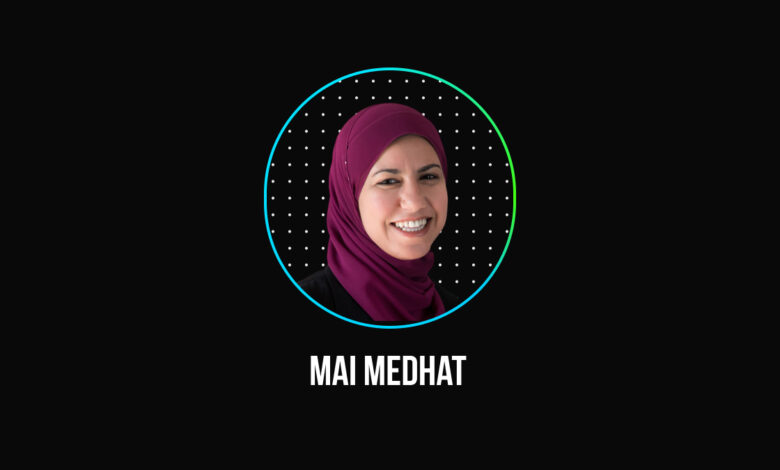Mai Medhat: How Egyptian Serial Entrepreneur Cracked the SaaS Exit Code

Mai Medhat built Eventtus into one of MENA’s most successful SaaS exits, then pivoted to AI before the hype cycle peaked. Her playbook offers rare insights into scaling B2B platforms across 35+ countries and navigating acquisition negotiations with US buyers.
While most MENA entrepreneurs struggle to achieve meaningful exits, Mai executed a strategic acquisition by US-based Bevy in 2021—then immediately started building her next company in the AI space. Here’s what her journey reveals about building venture-scale businesses in the region.
The Eventtus Case Study: Building B2B SaaS That Scales
Eventtus wasn’t just another event platform—it was a 9-year case study in how to build B2B SaaS that actually works in MENA markets. Launched in 2012, the startup powered over 15,000 events across 35+ countries, proving Egyptian entrepreneurs could build globally competitive software.
The numbers tell the story: Eventtus achieved multinational scale while bootstrapping through early years, then attracted regional investment to fuel expansion. The platform solved real-time event engagement and networking—problems that got exponentially more valuable during the pandemic.
What Made Eventtus Different
Most event tech companies focus on logistics (registration, check-in, payments). Eventtus targeted engagement—helping attendees network and participate during events. That positioning became crucial when virtual and hybrid events exploded during COVID-19.
The acquisition timing by Bevy makes strategic sense: virtual events platforms needed engagement technology, while Eventtus needed distribution scale for global expansion. Mai’s team had built the engagement layer; Bevy provided the infrastructure platform.
Mai Medhat From Exit to AI: Reading Market Timing
Mai’s post-acquisition move reveals sophisticated market timing. After serving as VP of Innovation at Bevy through 2023, she launched Ginni AI—a sales enablement platform using AI agents to help teams close deals faster.
The pivot isn’t random. Event tech taught her how businesses struggle with relationship management and engagement tracking. Sales enablement AI solves similar problems at larger scale, with bigger market opportunity and higher customer lifetime value.
Ginni AI targets the estimated $15 billion sales enablement software market, applying lessons learned from building B2B platforms in emerging markets. The focus on AI agents positions the company for the current technology cycle while leveraging her proven ability to build engagement-focused software.
The Strategic Pattern
Mai’s career shows a clear pattern: identify engagement problems in business workflows, build software solutions that work across cultures and markets, then scale through strategic partnerships or acquisitions.
This approach differentiates her from many MENA entrepreneurs who copy Silicon Valley models. Instead, she builds solutions for universal business problems with local market knowledge and global scaling ambitions.
Global Recognition and Industry Impact
Mai’s invitation to speak at Davos in 2016 and the Global Entrepreneurship Summit with Barack Obama and Mark Zuckerberg marked Egypt’s emergence on the global entrepreneurship stage. These weren’t token appearances—they represented validation of MENA’s growing tech ecosystem.
Her visibility helped legitimize Egypt’s startup scene for international investors and partners. As one of the few female tech entrepreneurs achieving regional scale, she became a reference point for women entering technology entrepreneurship across the Middle East.
The international recognition created network effects that benefited the broader ecosystem. Mai’s connections and credibility opened doors for other Egyptian entrepreneurs seeking global partnerships and investment.
Lessons for MENA Entrepreneurs
Mai’s playbook offers specific insights for founders building in emerging markets:
Market Selection Strategy
Choose problems that exist globally but require local market knowledge to solve effectively. Event engagement works the same way in Dubai, London, or San Francisco, but cultural nuances matter for user adoption and retention.
Scaling Across Borders
Building in Egypt while targeting 35+ countries requires infrastructure decisions that support international expansion from day one. Technical architecture, legal structures, and team composition must accommodate multi-market operations.
Exit Preparation
The Eventtus acquisition by Bevy demonstrates how strategic fit matters more than valuation multiples. Mai positioned Eventtus as essential technology for Bevy’s platform, creating natural acquisition logic.
Technical Background and Expertise
Mai holds a Computer Engineering degree from Ain Shams University in Cairo, providing the technical foundation for building complex software platforms. Her engineering background influences product decisions and technical team leadership.
Her expertise spans startup fundraising, B2B SaaS growth, and now AI-powered sales technology. This combination of technical skills and business acumen enables hands-on involvement in product development while managing strategic relationships.
Current Focus Areas
- AI Sales Enablement: Building intelligent agents for sales team productivity
- B2B SaaS Strategy: Scaling software platforms across international markets
- Women in Tech: Mentoring female entrepreneurs across the MENA region
- Market Expansion: Cross-border business development for emerging market startups
Industry Connections and Influence
Connect with Mai Medhat:
- LinkedIn – Professional updates and industry insights
- Twitter (X) – Technology and entrepreneurship commentary
- Instagram – Personal brand and speaking engagements
Related MENA Tech Leaders
- Fadi Ghandour: Building Aramex and Wamda
- Mudassir Sheikha: The Careem Exit Strategy
- Top Female Tech Entrepreneurs in Egypt
- MENA Startup Exits: Lessons from Successful Founders
“The key insight from building Eventtus was understanding that engagement technology works the same everywhere, but implementation must respect local business cultures and practices.”
What This Means for MENA Tech
Mai Medhat’s trajectory—from Computer Engineering graduate to serial entrepreneur with international recognition—illustrates the maturation of Egypt’s tech ecosystem. Her success provides a roadmap for the next generation of MENA entrepreneurs targeting global markets.
The combination of technical skills, business execution, and strategic thinking that enabled her success is increasingly common among Egyptian tech professionals. This suggests the ecosystem will produce more venture-scale companies and meaningful exits over the next decade.
For international investors and partners, Mai’s companies demonstrate the quality and ambition of MENA entrepreneurs who understand both local markets and global technology trends.



